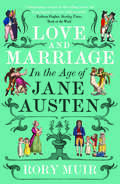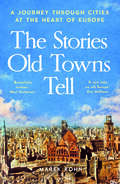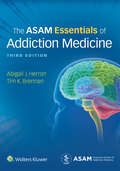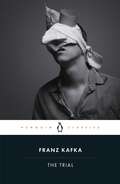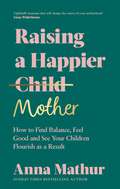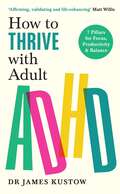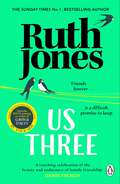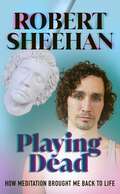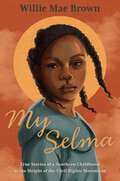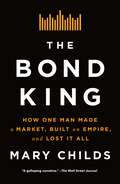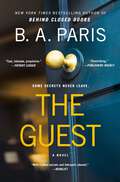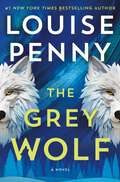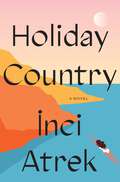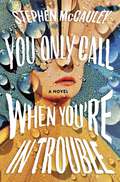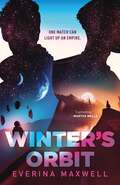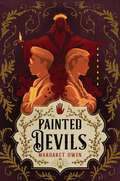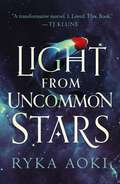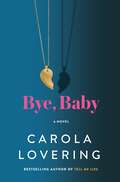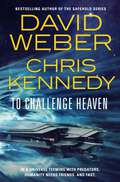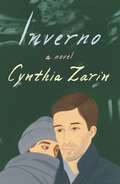- Table View
- List View
Love and Marriage in the Age of Jane Austen
by Rory MuirWhat happened when Jane Austen’s heroines and heroes were finally wed? Marriage is at the centre of Jane Austen’s novels. The pursuit of husbands and wives, advantageous matches, and, of course, love itself, motivate her characters and continue to fascinate readers today. But what were love and marriage like in reality for ladies and gentlemen in Regency England? Rory Muir uncovers the excitements and disappointments of courtship and the pains and pleasures of marriage, drawing on fascinating first-hand accounts as well as novels of the period. From the glamour of the ballroom to the pressures of careers, children, managing money, and difficult in-laws, love and marriage came in many guises: some wed happily, some dared to elope, and other relationships ended with acrimony, adultery, domestic abuse, or divorce. Muir illuminates the position of both men and women in marriage, as well as those spinsters and bachelors who chose not to marry at all. This is a richly textured account of how love and marriage felt for people at the time—revealing their unspoken assumptions, fears, pleasures, and delights.
The Stories Old Towns Tell: A Journey through Cities at the Heart of Europe
by Marek KohnA journey through Europe’s old towns, exploring why we treasure them—but also what they hide about a continent’s fraught history “[A] fascinating chronicle.”—Benjamin Balint, Wall Street Journal Historic quarters in cities and towns across the middle of Europe were devastated during the Second World War—some, like those of Warsaw and Frankfurt, had to be rebuilt almost completely. They are now centers of peace and civility that attract millions of tourists, but the stories they tell about places, peoples, and nations are selective. They are never the whole story. These old towns and their turbulent histories have been key sites in Europe’s ongoing theater of politics and war. Exploring seven old towns, from Frankfurt and Prague to Vilnius in Lithuania, the acclaimed writer Marek Kohn examines how they have been used since the Second World War to conceal political tensions and reinforce certain versions of history. Uncovering hidden stories behind these old and old-seeming façades, Kohn offers us a new understanding of the politics of European history-making—showing how our visits to old towns could promote belonging over exclusion, and empathy over indifference.
The ASAM Essentials of Addiction Medicine
by Abigail Herron Timothy K. BrennanDerived from ASAM’s definitive work,Principles of Addiction Medicine, 6th Edition, this companion resource is ideal for residents, fellows, and practitioners in psychiatry, as well as addiction medicine specialists and other healthcare workers who provide care to patients with substance use disorders. Streamlined and easy to use, the Essentials volume provides authoritative information on everything from the pharmacology of addiction through diagnosis, assessment, and early intervention—all in concise, easy-to-navigate format for ease of reference.
The Trial (Penguin Modern Classics)
by Franz KafkaA terrifying psychological trip into the life of one Joseph K., an ordinary man who wakes up one day to find himself accused of a crime he did not commit, a crime whose nature is never revealed to him. Once arrested, he is released, but must report to court on a regular basis--an event that proves maddening, as nothing is ever resolved. As he grows more uncertain of his fate, his personal life--including work at a bank and his relations with his landlady and a young woman who lives next door--becomes increasingly unpredictable. As K. tries to gain control, he succeeds only in accelerating his own excruciating downward spiral.
The Everyday Air Fryer Cookbook: Easy Meals for 1, 2 and more!
by Beverley Jarvis'I never thought I’d be an air fryer fan but Beverley Jarvis got me hooked.' - Prue LeithWhether you're cooking for yourself, your partner or your family, an air fryer is the perfect kitchen appliance to whip up quick, easy and delicious meals. Packed with dozens of simple, yet satisfying dishes, The Everyday Air Fryer Cookbook can take you from amateur to afficionado in no time at all.Master the basics of air-frying with quick and easy recipes for Speedy Roasties, Garlic and Herb Ciabatta, Baked Potatoes, Marinated Lamb Chops and Chicken Breasts.Then, turn your hand to crowd-pleasing favourites such as Roast Chicken with Lemon and Rosemary, comforting Salmon and Cod Fishcakes, delicious Roast Rack of Lamb with Roast New Potatoes, wonderfully crispy Scotch Eggs and the perfect Hasselback Potatoes.And indulge in air-fried desserts and sweet treats such as the ultimate Cheese Scones, meltingly beautiful Chocolate Fondants, teatime favourite Banana Bread, comforting Apple, Pear and Raspberry Crumble and simple Speedy Carrot Cake Muffins.With recipes for every mood and occasion, this is the perfect introduction to the amazing versatility of the humble air fryer.
Raising A Happier Mother: The empowering guide to motherhood and must-read book for any new mum
by Anna MathurTHE PERFECT, THOUGHTFUL GIFT FOR THE MUM IN YOUR LIFE!This isn't a parenting book.This isn't a guide to being a perfect parent (spoiler: they don't exist)This is a book about you.We can only anchor, nurture, nourish and instill confidence in our children when we extend the same support to ourselves. After all, how can we effectively tend to our children's needs when our energy reserves are depleted? How can we lead by example and teach our children the importance of healthy self-esteem if we are struggling with these things ourselves? There are a thousand and one ways to parent, and only one way that's authentic for you.Drawing on her work as a psychotherapist, alongside her own experiences as a mother, Anna shows that caring with our children begins with caring for ourselves, and it's time to replace exhaustion with empowerment. Far from being selfish, self-care is an essential quality of a happier mother good parent. The greatest gift you can give to to yourself and your children, is to give yourself permission to thrive.
How to Thrive with Adult ADHD: 7 Pillars for Focus, Productivity and Balance
by Dr James Kustow‘Affirming, validating and life-enhancing – if you think you may have ADHD, this book is for you’– Matt Willis, musician and podcasterDon’t just manage your ADHD – thrive with itIf you have, or suspect you have, ADHD, or you simply feel stuck – drowning in half-finished tasks, unhelpful habits and a perpetual feeling that you can’t seem to ‘get it together’ – then this book is for you.As a leading adult ADHD psychiatrist, who himself has ADHD, Dr James Kustow passionately believes that the goal should not be to just ‘manage’ ADHD, but to thrive with it. This ground-breaking book will allow you to assess if and how the condition affects you, mapping your unique ‘ADHD signature’, before leading you through a seven-pillar plan of small but powerful habit changes. You will learn:How to stabilise your sleep, schedule and surroundings, so you can direct energy to the things that really matter.Easy-to-implement strategies and tools to streamline your life.Simple techniques to calm your mind, reduce the ‘noise’ and achieve your goals, underpinned by a growth-oriented mindset.Practical ways to optimise your nutrition and reduce toxic exposures, to improve brain health.In small, manageable steps, you can transform the chaos into focus, productivity and balance – for life.
Us Three: The funny and uplifting Sunday Times bestseller from the co-creator of Gavin & Stacey
by Ruth Jones***THE INSTANT SUNDAY TIMES BESTSELLER***'A touching celebration of the beauty and endurance of female friendship. There is nothing mightier. Fact.' DAWN FRENCHThe new novel from Ruth Jones, co-creator of Gavin & Stacey and author of the smash-hit, number one bestselling debut, Never Greener.Friends forever is a difficult promise to keep...Meet Lana, Judith and Catrin. Best friends since primary school when they swore an oath on a Curly Wurly wrapper that they would always be there for each other, come what may.After the trip of a lifetime, the three girls are closer than ever. But an unexpected turn of events shakes the foundation of their friendship to its core, leaving their future in doubt - there's simply too much to forgive, let alone forget. An innocent childhood promise they once made now seems impossible to keep . . .Packed with all the heart and empathy that made Ruth's name as a screenwriter and now author, Us Three is a funny, moving and uplifting novel about life's complications, the power of friendship and how it defines us all.Prepare to meet characters you'll feel you've known all your life - prepare to meet Us Three.*****Praise for Us Three:'A warm, smart, uplifting tale of true friendship.' BETH O'LEARY'This novel oozes warmth and honesty. A big-hearted book that provides a cast of characters you'll lose your heart to.' ADELE PARKS'I loved this brilliantly gripping depiction of the complexities of female friendship over the years. Love, betrayal, comedy and loss - Us Three has it all.' FIONA NEILL*****Readers love Us Three:'I love the way Ruth Jones writes. The relationship between the 3 friends is perfect and a wonderful book to read about friendship''I absolutely loved this so much. There were moments that made me cry and other moments that made me laugh.''Best book of the year so far. To sum it up I'd say "it was bloody lush"'****RUTH'S BRILLIANT NEW NOVEL LOVE UNTOLD IS OUT NOW****
One Pot Wonders: Easy and delicious feasting without the hassle
by Lindsey BarehamNot got the ingredients, time or energy for a gourmet meal? Rustle up a mouth-watering one pot wonder to feed the whole family'100 simple and nutritious recipes for meals packed with flavour without standing at the kitchen sink for hours afterwards' Aldo Zilli, Sunday Express_______Whip up soul-soothing comfort food without the pain of endless washing up with One Pot Wonders. With simple ingredients and step-by-step guidance, you can create wholesome, satisfying and time-saving dishes in just - that's right - one pot!Stand-out recipes include:· Lindsey's OVEN BAKED MEATBALLS with sweet potato and roasted shallots· Refreshing GRILLED HALLOUMI SALAD with avocado and lime· Creamy SRI LANKAN CHICKEN CURRY with sweet potato and spinach· ARTICHOKE LINGUINI with green olives and parmesan· Tasty SALMON CONFIT, BROWN SHRIMP and samphire noodles· Warming GOOSEBERRY AND ELDERFLOWER almond crumbleWith dishes to suit every appetite, this collection is divided into the following chapters:· Fry-ups· Salads· Bakes· Big Soups· Stews· Curries· Pasta· Noodles· Rice· PuddingsOne Pot Wonders brings together big flavours from all around the world in delicious, simple and satisfying recipes that everyone will love - especially your washing up bowl.
The Modern Midwife's Guide to the First Year
by Marie LouiseThe book you can trust to guide you through the highs and lows of parenthood.Whether you're preparing for your baby to arrive, have just welcomed your little one into the world, or are well into the fourth trimester, this nurturing guide will ensure you feel supported and informed throughout your baby's first year.Following on from where The Modern Midwife's Guide to Pregnancy, Birth and Beyond left off, this book will take you through the first 48 hours after birth up until your baby's first birthday.From postpartum recovery to establishing a routine and looking out for signs to start weaning, Marie Louise will guide you through each stage of your baby's development. Packed with interesting facts, the most up-to-date insights and bringing together a whole host of childcare experts, you'll find everything you need to feel calm and confident about the exciting months ahead.
Playing Dead: How Meditation Brought Me Back to Life
by Robert Sheehan'A wit and wisdom that harkens back to an age of enlightenment' – RON PERLMAN, ACTOR'A meditation guide from a man with a mind most unlikely to be conducive to meditation' – MANCHÁN MAGAN, WRITER AND BROADCASTER'In this beautifully written story, Robert Sheehan shares his journey from chaos to stillness and how meditation can lead us to a place of connection and calm' – DEB DANA, AUTHOR OF ANCHORED From Robert Sheehan, star of Misfits and The Umbrella Academy, and host of hit podcast The Earth Locker, comes a heartfelt journey to inner peace.In Playing Dead, Robert Sheehan shares intimate reflections on his search for purpose, looking back at the adventures – and misadventures – of his life so far, and sharing the profoundly transformative lessons he has learnt along the way.Meditation is at the heart of Robert's route to spiritual awakening. In Playing Dead he reveals the turbulence in his life that led him to seek calm and tranquility within. A beautiful, meandering memoir reflecting a rich tapestry of experience, uncovering how spirituality has become his anchor in the constant moving tide. Combining storytelling with letters, poetry, childhood memories and thoughtful musings on fame.Through this compelling description of his quest for inner stillness, Robert shows us how we can welcome a practice of meditation into our own lives, with tools for soothing your nervous system and focusing a fretful mind. In a world where our attention is constantly up for grabs, Playing Dead shows how we can give our souls the deep rest we crave.
Good Clean Fun
by Michael ArdittiShort stories from the award-winning, bestselling and acclaimed Michael Arditti'[These stories] simply and elegantly break your heart. They deserve a wide audience, and will create a wiser one' Amanda CraigArditti imbues his stories of loneliness, confusion and the uncertainties of sexual neophytes with genuine pathos and . . . humour' The TimesA young boy discovers the ambiguity of adult affection. A camp comedian cracks up on stage. A picture-restorer learns to accept her husband's true nature. A travel agent tastes the mysterious power of the Internet. A honeymoon couple take an unconventional route to love . . .These stories employ a spectrum of different voices to explore all aspects of experience - friendship, family, misunderstandings, frustrations, griefs and joys. They will appeal not only to the author's loyal readers, but also to a broad new readership for their assured style, humour, compassion and insight.
My Selma: True Stories of a Southern Childhood at the Height of the Civil Rights Movement
by Willie Mae BrownPerfect for fans of Jacqueline Woodson's Brown Girl Dreaming, debut author Willie Mae Brown crafts an unforgettable memoir about growing up amidst the civil rights movement in a town at the crossroads of history. As the civil rights movement and the fight for voter rights unfold in Selma, Alabama, many things happen inside and outside the Brown family’s home that do not have anything to do with the landmark 1965 march across the Edmund Pettus Bridge. Yet the famous outrages which unfold on that span form an inescapable backdrop in this collection of stories about the everyday and the extraordinary. In one, twelve-year-old Willie Mae takes it upon herself to offer summer babysitting services to a glamorous single white mother—a secret she keeps from her parents that unravels with shocking results. In another, Willie Mae reluctantly joins her mother at a church rally, and is forever changed after hearing Martin Luther King Jr. deliver a defiant speech in spite of a court injunction. Infused with the vernacular of her Southern upbringing, My Selma captures the voice and vision of a fascinating young person—perspicacious, impetuous, and resourceful in her ways of seeing the world around her—who gifts us with a loving portrayal of her hometown while also delivering a no-holds-barred indictment of the time and place.
The Bond King: How One Man Made a Market, Built an Empire, and Lost It All
by Mary ChildsFrom the host of NPR’s Planet Money, the deeply-investigated story of how one visionary, dogged investor changed American finance forever.Before Bill Gross was known among investors as the Bond King, he was a gambler. In 1966, a fresh college grad, he went to Vegas armed with his net worth ($200) and a knack for counting cards. $10,000 and countless casino bans later, he was hooked: so he enrolled in business school.The Bond King is the story of how that whiz kid made American finance his casino. Over the course of decades, Bill Gross turned the sleepy bond market into a destabilized game of high risk, high reward; founded Pimco, one of today’s most powerful, secretive, and cutthroat investment firms; helped to reshape our financial system in the aftermath of the Great Recession—to his own advantage; and gained legions of admirers, and enemies, along the way. Like every American antihero, his ambition would also be his undoing.To understand the winners and losers of today’s money game, journalist Mary Childs argues, is to understand the bond market—and to understand the bond market is to understand the Bond King.
The Guest: A Novel
by B.A. ParisNew York Times bestselling author B. A. Paris captivated psychological thriller readers everywhere with Behind Closed Doors. Now she invites you into another home full of heart-pounding secrets, in The Guest.Some secrets never leave.Iris and Gabriel have just arrived home from a make-or-break holiday. But a shock awaits them. One of their closest friends, Laure, is in their house. The atmosphere quickly becomes tense as she oversteps again and again: sleeping in their bed, wearing Iris' clothes, even rearranging the furniture.Laure has walked out on her husband—and their good friend—Pierre, over his confession of an affair and a secret child. Iris and Gabriel want to be supportive of their friends, but as Laure's mood becomes increasingly unpredictable, her presence takes its toll.Iris and Gabriel's only respite comes in the form of a couple new to town. But with them comes their gardener, who has a checkered past. Soon, secrets from all their pasts will unravel, some more dangerous than they could have known.
The Grey Wolf: A Novel (Chief Inspector Gamache Novel #19)
by Louise PennyINSTANT #1 NEW YORK TIMES BESTSELLERThe 19th mystery in the #1 New York Times-bestselling Armand Gamache series.Relentless phone calls interrupt the peace of a warm August morning in Three Pines. Though the tiny Québec village is impossible to find on any map, someone has managed to track down Armand Gamache, head of homicide at the Sûreté, as he sits with his wife in their back garden. Reine-Marie watches with increasing unease as her husband refuses to pick up, though he clearly knows who is on the other end. When he finally answers, his rage shatters the calm of their quiet Sunday morning. That's only the first in a sequence of strange events that begin THE GREY WOLF, the nineteenth novel in Louise Penny's #1 New York Times-bestselling series. A missing coat, an intruder alarm, a note for Gamache reading "this might interest you", a puzzling scrap of paper with a mysterious list—and then a murder. All propel Chief Inspector Gamache and his team toward a terrible realization. Something much more sinister than any one murder or any one case is fast approaching. Armand Gamache, Jean-Guy Beauvoir, his son-in-law and second in command, and Inspector Isabelle Lacoste can only trust each other, as old friends begin to act like enemies, and long-time enemies appear to be friends. Determined to track down the threat before it becomes a reality, their pursuit takes them across Québec and across borders. Their hunt grows increasingly desperate, even frantic, as the enormity of the creature they’re chasing becomes clear. If they fail the devastating consequences would reach into the largest of cities and the smallest of villages. Including Three Pines.
Holiday Country: A Novel
by İnci AtrekNATIONAL BESTSELLER • A seductive and lyrical debut following a young woman’s dangerous summer romance during an idyllic vacation on the Aegean coast "A gorgeous exploration." —Raven Leilani, author of Luster"A beautiful novel from a promising new voice." ―Elif Batuman, author of The Idiot and Either/OrAda always looks forward to her summers at the family villa with her mother and grandmother in a Turkish seaside town. It’s easy to leave life in California behind when the days are filled with boat rides, games at the beach, and long swims with friends. But no matter how much Ada feels she belongs in the country where her mother grew up, deep down, her connection to the culture seems as fleeting as the seasons. It’s certainly no help that her mother has lost her own sense of self, rootless and disoriented after so many years abroad.When an old family friend mysteriously shows up in their town, Ada can’t help imagining a different future for her mother―one that promises a return to home, to love, to happiness. But while playing matchmaker, Ada has to come to terms with her own intensifying attraction to the newcomer. Does the future she’s fighting for belong to her mother—or to her alone?Lush and evocative, İnci Atrek’s Holiday Country is a rapturous meditation about what it means to be of two worlds, the limitations and freedom of a life in translation, and the alluring promise of love’s anchor for the unmoored.
You Only Call When You're in Trouble: A Novel
by Stephen McCauley“I don’t think I will find a book I love more this year.”—Jane Green, New York Times bestselling author“Funny, poignant, joyous, explosive, but most of all affirming of our connections to one another. You Only Call When You're in Trouble is a book to cherish. A book that loves you back. What more could you want, my gosh? Read it!”—Andrew Sean Greer, Pulitzer Prize-winning author of Less Is LostIs it ever okay to stop caring for others and start living for yourself?After a lifetime of taking care of his impossible but irresistible sister and his cherished niece, Tom is ready to put himself first. An architect specializing in tiny houses, he finally has an opportunity to build his masterpiece—“his last shot at leaving a footprint on the dying planet.” Assuming, that is, he can stick to his resolution to keep the demands of his needy family at bay. Naturally, that’s when his phone rings. His niece, Cecily—the real love of Tom’s life, as his boyfriend reminded him when moving out—is embroiled in a Title IX investigation at the college where she teaches that threatens her career and relationship. And after decades of lying, his sister wants him to help her tell Cecily the real identity of her father. Tom does what he’s always done—answers the call. Thus begins a journey that will change everyone’s life and demonstrate the beauty or dysfunction (or both?) of the ties that bind families together and sometimes strangle them. Warm, funny, and deeply moving, You Only Call When You’re in Trouble is an unforgettable showcase for Stephen McCauley’s distinctive voice and unique ability to create complex characters that jump off the page and straight into your heart.
Ripley: Dogs with a Purpose (Dogs with a Purpose)
by W. Bruce CameronRipley: Fire Station Five is a new Dogs with a Purpose adventure from the #1 New York Times bestselling author of A Dog's Purpose, W. Bruce Cameron!Some dogs were born to lend a helping hand (or paw!).Ripley, a border collie puppy, is one of them. He’s smart, fast, and brave. Ben thinks he’ll be a perfect fit for his fire station!To prove himself to the Station Five team, Ripley must learn to run headfirst into danger, assist on daring rescues, and keep victims safe until help arrives. But there are other ways to save lives. In the aftermath of a devastating house fire, he meets a young girl named Samantha. She shows him that sometimes, rescuing somebody means helping them face their fears.Does Ripley have what it takes?Ripley: Fire Station Five is a fun, heartwarming adventure that will introduce young readers to the bravery and hard work of fire rescue dogs.More Tales from Bruce Cameron!FROM STARSCAPE:THE PUPPY TALES SERIES:Ellie's Story / Bailey's Story / Molly's Story / Max's Story / Lily's Story / Shelby's Story / Toby's Story / Bella's Story / Cooper's Story / Lacey's Story / Piper's StoryTHE LILY TO THE RESCUE SERIES:Lily to the Rescue / Lily to the Rescue: Two Little Piggies / Lily to the Rescue: The Not-So-Stinky Skunk / Lily to the Rescue: Dog Dog Goose / Lily to the Rescue: Lost Little Leopard / Lily to the Rescue: The Misfit Donkey / Lily to the Rescue: Foxes in a Fix / Lily to the Rescue: The Three BearsTHE DOGS WITH A PURPOSE SERIES:Zeus: Water Rescue / Ripley: Fire Station FiveFROM FORGE:THE DOG'S PURPOSE SERIES:A Dog's Purpose / A Dog's Journey / A Dog's PromiseTHE DOG'S WAY HOME SERIES:A Dog's Way Home / A Dog's CourageOTHER TITLES FROM FORGE:Love, Clancy: Diary of a Good DogA Dog's Perfect ChristmasThe Dogs of ChristmasThe Dog MasterEmory's GiftTHE RUDDY MCCAN SERIES:The Midnight Plan of the Repo Man / Repo Madness / The Midnight Dog of the Repo ManAt the Publisher's request, this title is being sold without Digital Rights Management Software (DRM) applied.
Winter's Orbit (The Resolution Universe)
by Everina MaxwellA Sunday Times Bestseller!A 2022 Alex Award Winner! “Sparks fly” (NPR) in Everina Maxwell’s gut-wrenching and romantic space opera debut.Prince Kiem, a famously disappointing minor royal and the Emperor's least favorite grandchild, has been called upon to be useful for once. He's commanded to fulfill an obligation of marriage to the representative of the Empire's newest and most rebellious vassal planet. His future husband, Count Jainan, is a widower and murder suspect. Neither wants to be wed, but with a conspiracy unfolding around them and the fate of the empire at stake they will have to navigate the thorns and barbs of court intrigue, the machinations of war, and the long shadows of Jainan's past, and they'll have to do it together. So begins a legendary love story amid the stars.Like Ancillary Justice meets Red, White and Royal Blue, Winter’s Orbit is perfect for fans of Lois McMaster Bujold. “High-pitched noises escaped me; I shouted, more than once, 'Now kiss!' ... in a world so relentlessly uncertain, there’s a powerfully simple pleasure in the experience of a promise kept.” —The New York Times Book ReviewAt the Publisher's request, this title is being sold without Digital Rights Management Software (DRM) applied.
Painted Devils (Little Thieves #2)
by Margaret OwenAn Instant New York Times Bestseller!An Instant Indies Bestseller!A scrappy former maid and jewel thief must outwit gods, injustice, and her own past in this sequel to the Indie Next Pick, Little Thieves by Margaret Owen.Let's get one thing straight - Vanja Schmidt wasn't trying to start a cult.After taking down a corrupt margrave, breaking a deadly curse, and finding romance with the vexingly scrupulous junior prefect Emeric Conrad, Vanja had one great mystery left: her long-lost birth family . . . and whether they would welcome a thief. But in her search for an honest trade, she hit trouble and invented a god, the Scarlet Maiden, to scam her way out. Now that lie is growing out of control—especially when Emeric arrives to investigate and the Scarlet Maiden manifests to claim him as a virgin sacrifice.For his final test to become a prefect, Emeric must determine if Vanja is guilty of serious fraud or if the Scarlet Maiden—and her claim to him—is genuine. Meanwhile, Vanja is chasing an alternative sacrifice that could be their way out. The hunt leads her not only into the lairs of monsters and the paths of gods, but also the ties of her past. And with what should be the simplest way to save Emeric hanging over their heads, he and Vanja must face a more dangerous question: Is there a future for a thief and a prefect, and at what price?From the indie bestselling author Margaret Owen comes the thrilling next installment in the Little Thieves trilogy with all new interior illustrations from the author.
Light From Uncommon Stars
by Ryka AokiGood Omens meets The Long Way to a Small, Angry Planet in Ryka Aoki's Light From Uncommon Stars, a defiantly joyful adventure set in California's San Gabriel Valley, with cursed violins, Faustian bargains, and queer alien courtship over fresh-made donuts.Hugo Award FinalistA National BestsellerIndie Next PickNew York Public Library Top 10 Book of 2021A Kirkus Best Book of 2021A Barnes & Noble Best Science Fiction Book of 20212022 Alex Award Winner2022 Stonewall Book Award WinnerShizuka Satomi made a deal with the devil: to escape damnation, she must entice seven other violin prodigies to trade their souls for success. She has already delivered six. When Katrina Nguyen, a young transgender runaway, catches Shizuka's ear with her wild talent, Shizuka can almost feel the curse lifting. She's found her final candidate. But in a donut shop off a bustling highway in the San Gabriel Valley, Shizuka meets Lan Tran, retired starship captain, interstellar refugee, and mother of four. Shizuka doesn't have time for crushes or coffee dates, what with her very soul on the line, but Lan's kind smile and eyes like stars might just redefine a soul's worth. And maybe something as small as a warm donut is powerful enough to break a curse as vast as the California coastline.As the lives of these three women become entangled by chance and fate, a story of magic, identity, curses, and hope begins, and a family worth crossing the universe for is found.At the Publisher's request, this title is being sold without Digital Rights Management Software (DRM) applied.
Bye, Baby: A Novel
by Carola LoveringNATIONAL BESTSELLER • A March 2024 Indie Next and LibraryReads Pick"Powerful, relatable and crazily addictive, Bye, Baby takes an unflinching look at the battling forces of toxicity and love which define so many female friendships. I couldn't put it down." ––Rosie Walsh, New York Times bestselling author of Ghosted and The Love of My LifeEvery friendship has its shadow...On a brisk fall night in a New York apartment, 35-year-old Billie West hears terrified screams. It's her lifelong best friend Cassie Barnwell, one floor above, and she's just realized her infant daughter has gone missing. Billie is shaken as she looks down into her own arms to see the baby, remembering—with a jolt of fear—that she is responsible for the kidnapping that has instantly shattered Cassie’s world.Once fiercely bonded by their secrets, Cassie and Billie have drifted apart in adulthood, no longer the inseparable pair they used to be in their small Hudson Valley hometown. Cassie is married to a wealthy man, has recently become a mother, and is building a following as a lifestyle influencer. She is desperate to leave her past behind—including Billie, who is single and childless, and no longer fits into her world. But Billie knows the worst thing Cassie has ever done, and she will do whatever it takes to restore their friendship…Told in alternating perspectives in Lovering’s signature suspenseful style, Bye, Baby confronts the myriad ways friendships change and evolve over time, the lingering echoes of childhood trauma, and the impact of women’s choices on their lifelong relationships.
To Challenge Heaven (Out of the Dark #3)
by David Weber Chris KennedyThe third entry into the New York Times bestselling series, To Challenge Heaven brings another thrilling adventure from the masters of military science fiction, David Weber and Chris Kennedy.In a universe teeming with predators, humanity needs friends. And fast.We've come a long way in the forty years since the Shongairi attacked Earth, killed half its people, and then were driven away by an alliance of humans with the other sentient bipeds who inhabit our planet.We took the technology they left behind, and rapidly built ourselves into a starfaring civilization. Because we haven't got a moment to lose. Because it's clear that there are even more powerful, more hostile aliens out there, and Earth needs allies.But it also transpires that the Shongairi expedition that nearly destroyed our home planet ... wasn't an official one. That, indeed, its commander may have been acting as an unwitting cats-paw for the Founders, the ancient alliance of very old, very evil aliens who run the Hegemony that dominates our galaxy, and who hold the Shongairi, as they hold most non-Founder species, in not-so-benign contempt. Indeed, it may turn out to be possible to turn the Shongairi into our allies against the Hegemony. There's just the small matter of the Shongairi honor code, which makes bushido look like a child's game. We might be able to make them our friends -- if we can crush their planetary defenses in the greatest battle we, or they, have ever seen...At the Publisher's request, this title is being sold without Digital Rights Management Software (DRM) applied.
Inverno: A Novel
by Cynthia ZarinA daring, heartbreaking novel, Inverno is the book that J. D. Salinger’s Franny Glass might have written a few decades into her adulthood.Caroline waited for fifteen minutes in the snow. After a little time had passed, she was simply waiting to see what would happen. It was entirely possible he would not come. If he did not come, she would be in a different story than the one she had imagined, but it was possible, she knew, to imagine anything.Inverno is a love story that stretches across decades. Inverno is also the story of Caroline, waiting in Central Park in a snowstorm for her phone to ring, yards from where, thirty years ago, Alastair, as a boy, hid in the trees. Will he call? Won’t he? The story moves the way the mind does: years flash by in an instant—now we are in the perilous world of fairy tale, now stranded anew in childhood, with its sorrows and harsh words. Ever present are the complicated negotiations of the heart. This brilliantly original novel by Cynthia Zarin, author of An Enlarged Heart, is a kaleidoscope in which the past and the present shatter. Elliptical and inventive in the mode of Elizabeth Hardwick’s Sleepless Nights, Inverno is miraculous and startling. It asks, How does love make and unmake a life?
